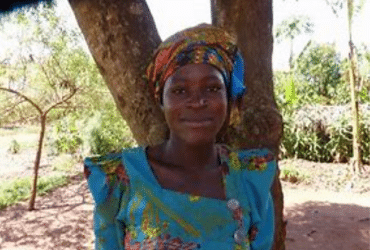“There was a time when I needed a shoulder to cry on, an ear of sympathy, a smooth hand to wipe my tears,” reflected Winnie Nabaale, now age 32, from Kagologolo Village in Ssembabule District, Uganda.
Years ago Winnie was engaged and was told by her parents not to return home. Winnie became pregnant and was married. Her husband rented a small house for her, but just three months later, he refused to help her or see her again.
Winnie came alone to her first antenatal visit at the village health center, where she was told she was having twins. Winne was worried because she was unable to work, unable to pay rent, or even support herself with the basic needs. The landlord evicted Winnie, and she was left pregnant and alone. Winnie moved to a friend’s home in Kanabulemu village, far south of Ssembabule.
Unable to afford even a bicycle taxi to take her to the health center which was miles away over poor roads, she could not continue with the antenatal care. When Winnie started feeling labor pains, she did not know what to do. By the third day of intense pain, her friend took her to an aged traditional birth attendant. The twins died. Winnie suffered an obstetric fistula injury which left her weak and incontinent. Winnie mourned the death of her twins, lost her appetite, and suffered depression. She contemplated suicide.
Two years later, Winnie’s friend heard a radio announcement about free fistula treatment at Kitovu Hospital in Masaka. Winnie went. The damage was so severe that her first repair was not successful, and the hospital staff arranged for her to return for a second surgery. In that time Winnie joined the post fistula women piglet project. Restored with courage and hope, Winnie trained and prepared for managing a small piggery business.
Winnie received a female piglet on March 3, 2015. Winnie entrusted her “sweet piglet” to her friend’s care while she returned to Kitovu for the second repair. Now filled with the joy of continence, Winnie returned home to rear the pig. At its first litter, Winnie’s pig produced ten piglets: five females, four boars, and one that died at birth. She passed on two females to her two friends, one to the owner of the servicing boar, and kept six. The mother pig died from swine fever when it was pregnant with a second litter. Determined, Winnie sold 2 boars at $67 USD each to help her buy medicine for the remaining pigs, open a fresh vegetable and fish stall, lease a small plot of land, and hire a local laborer to till it.
Assessing her growing income projects, Winnie says, “I still have a female pig on my farm which will replace the original mother pig. I am saving $3 USD each week. I now move with my head held high. I am grateful to Microfinancing Partners in Africa and the pig project team for a gift that has restored my hope.”

